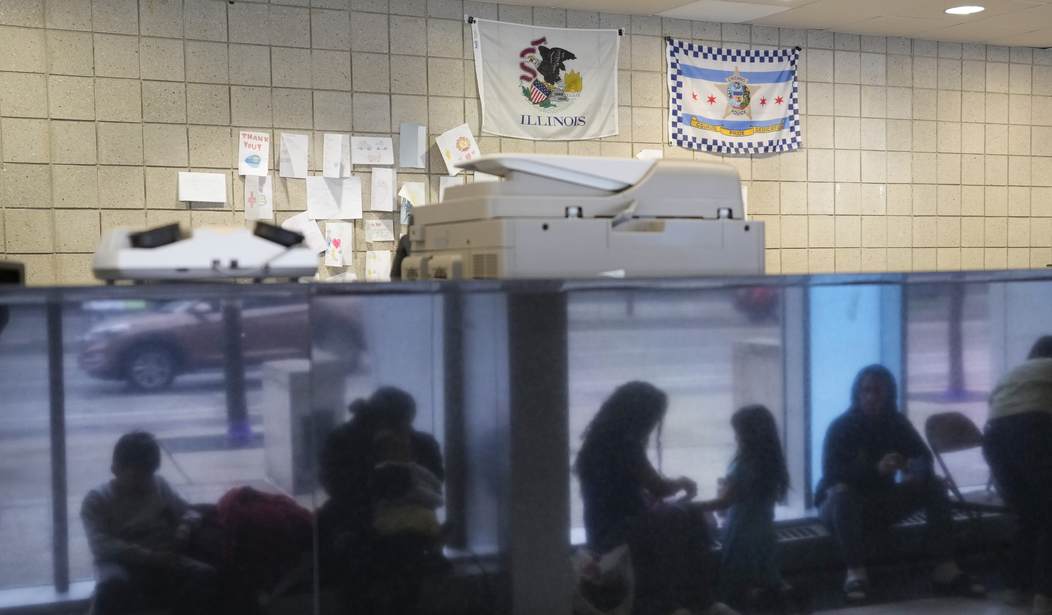The massive influx of migrants into Chicago — most of them from Central and South America — has the city’s Democrats at odds over what to do about them.
Nowhere are those divisions more evident than in the Hispanic community. Hispanics have become a political power over the last decade, and they have their own agenda they want to promote. The migrants may be Hispanic, but their needs are not the same as the native-born or immigrant Hispanics — illegal or otherwise.
Hispanics who have lived in the States for years without green cards or work permits are bitterly complaining about the newcomers getting the kind of assistance that illegals who have been here decades have not.
”What is the alternative, [being] a not-welcoming city? That’s wrong,” said the Rev. Emma Lozano, of Lincoln United Methodist Church. Lozano was speaking at a meeting in the Benito Juarez Community Academy where the city’s plans for a shelter in the Pilsen neighborhood to house newcomers were being discussed.
The meeting was just the latest sign of tensions boiling over across the city as officials predict that Chicago may soon see as many as 20 to 25 buses of migrants arrive a day. More than 15,000 migrants have arrived in the city since August 2022 and that number is expected to double in the next several weeks, according to officials.
”Eleven million have been living here for decades without work permits,” said Lozano. “We’re your neighbors, we’ve been here forever and we don’t have those workers’ permits.”
At what point will ordinary people put their foot down and say they’ve had enough? Most people are relatively tolerant and welcoming — as long as the powers that be don’t overdo it.
It’s like Mayor Eric Adams has been saying in New York City, “Although our compassion is limitless, our resources are not.”
This week, Ald. Brian Hopkins, 2nd, also wrote a letter to constituents calling for the closure of the largest migrant shelter in the city, the Inn of Chicago that is blocks from the Magnificent Mile. Though the shelter at 162 E. Ohio St. is in the neighboring 42nd Ward, Hopkins, the mayor’s hand-picked public safety committee chair, said he was nonetheless speaking up because “the situation has not improved” since he raised concerns surrounding narcotics sales, public intoxication and blocked pedestrian passageways in July.
In a statement to the Tribune, Ald. Brendan Reilly said he agreed with his colleague.
“The ‘experiment’ of housing 1,500 migrants at the Inn of Chicago has been an abject failure. The conditions there are deplorable and the property is not safe for the migrant families living there who are co-mingled with hundreds of single, young adult males,” he said in an email to the Tribune. “Not only do I worry for the health and welfare of these young migrant families — I also worry for the safety of my constituents and thousands of tourists and visitors who come to the area every day.”
Pilsen is a “neighborhood in transition,” as realtors like to say, and property taxes are going through the roof. But the issue for many of the residents was one of fairness. When they came to the U.S., there was no welcome mat put out. There were no funds given out so that the transition to live in America would be made easier.
“That’s enough, we know about everything that they’re getting,” yelled Esmerelda Cargoca in Spanish.
Cargoca questioned the amount of financial support that the migrants are receiving, saying that when she and her family arrived in the United States, they had to make the transition on their own.
But she also took the microphone to say that even after she requested support from the city during the pandemic, she did not get it.
“I lost my store during the pandemic and even after I asked for help I couldn’t get it, so I ask: Where is that help for people like myself?” she asked followed by applause from the auditorium.
“People are afraid to say what they really feel,” said Romulo Peralta, who drove from Jefferson Park to the meeting. He speaks only Spanish, so he wanted to attend the meeting where he would be heard. Mr. Peralta said he is an economist from Peru, and the math isn’t adding up “because we are paying for all of this and many refuse to go out and just find a job.”
No one wants to say what’s really on their minds: Why can’t we get what the migrants are getting now? It’s a good question that Mayor Brandon Johnson and the aldermen are too embarrassed to answer.










